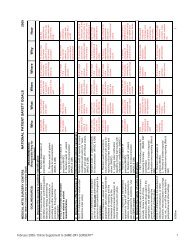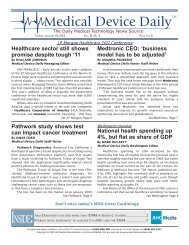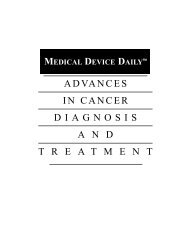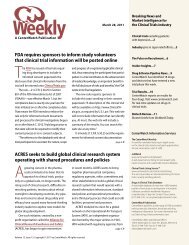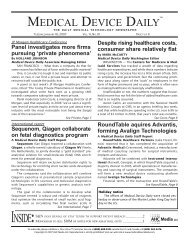MEDICAL DEVICE INNOVATION - Medical Device Daily
MEDICAL DEVICE INNOVATION - Medical Device Daily
MEDICAL DEVICE INNOVATION - Medical Device Daily
Create successful ePaper yourself
Turn your PDF publications into a flip-book with our unique Google optimized e-Paper software.
<strong>MEDICAL</strong> <strong>DEVICE</strong> <strong>INNOVATION</strong> 2010<br />
FDA gives green light for AVIVO<br />
cardio-monitoring by Corventis<br />
By OMAR FORD<br />
<strong>Medical</strong> <strong>Device</strong> <strong>Daily</strong> Staff Writer<br />
Patients are told all the time to be proactive with their<br />
health, by having annual check-ups and living a healthy<br />
lifestyle, but what if a med-tech company made a device<br />
that was proactive in the early detection of illnesses that<br />
could plague the heart.<br />
The what-if became a reality last week when<br />
Corventis (San Jose; California), a venture-funded medtech<br />
company started in 2005, reported FDA clearance for<br />
its AVIVO Mobile Patient Management System.<br />
AVIVO is a non-invasive, wireless system that monitors<br />
cardiovascular conditions. It is the company’s inaugural<br />
product and Corventis describes it as a platform system<br />
that helps to identify the company’s fundamental technological<br />
focus.<br />
“This is the first of two to three products we intend to<br />
launch,” Ed Manicka, president/CEO of Corventis told<br />
<strong>Medical</strong> <strong>Device</strong> <strong>Daily</strong>. “AVIVO actually watches the patient<br />
and monitors the heart. What we’re trying to do with the<br />
device is catch things in the patient before they occur and<br />
have an adverse effect.”<br />
AVIVO looks somewhat like a small Band Aid that is<br />
placed on the patient, but to call it that would be a grave<br />
misnomer, according to Manicka, since it could have much<br />
more than Band Aid-like impact. The company says it<br />
believes that this device could have tremendous cost saving<br />
benefits for patients and the healthcare industry as a<br />
whole.<br />
The device utilizes the company’s PiiX wearable sensor<br />
– key to the device’s ability to provide continuous ambulatory<br />
monitoring – providing insight into cardiovascular<br />
health during a person’s normal daily routines. The PiiX<br />
sensor automatically collects physiological information<br />
and wirelessly transmits the data from the patient to<br />
Corventis – at either its London or San Jose offices — for<br />
further analysis and presentation on a secure website.<br />
Currently electrocardiograms (ECG) and other tests<br />
performed in a hospital or clinic setting provide valuable<br />
information about the rhythm of the heart and overall<br />
patient health status. In many cases, however, it is necessary<br />
to monitor heart rhythm or other physiological signals<br />
for a longer period of time for a better understanding of the<br />
patient’s condition. But this is cumbersome with many current<br />
technologies.<br />
Because having no leads and wires, PiiX encourages<br />
patient-friendly, continuous wear, and it can be worn even<br />
while showering or sleeping. Automated collection and<br />
transmission of data also minimizes the number of steps<br />
required by the patient to ensure reliable event detection,<br />
according to the company.<br />
Corventis says that its wireless technology offers<br />
“ongoing visibility” into a patient’s cardiac health status,<br />
previously accessible primarily with invasive implantable<br />
devices.<br />
Multiple sensors on the PiiX enable what the company<br />
calls “intelligent detection” of clinical events and the creation<br />
of “comprehensive heart rate, respiratory rate, fluid<br />
status, and posture and activity trends. Clinical event information<br />
such as ECG is captured on an “exception” basis,<br />
according to the company, providing focused review and<br />
diagnosis by clinicians.<br />
There is a huge market for the device. More than two<br />
million Americans have atrial fibrillation, a cardiac arrhythmia<br />
increasingly being seen as putting a person at risk for<br />
stroke. And nearly 835,000 Americans are discharged from<br />
hospital care with cardiac arrhythmia diagnoses each year.<br />
Corventis was founded to primarily serve the cardiac<br />
health market – thereby deriving its name.<br />
“’Core’ is Latin for heart, and ‘ventis’ stands for innovation,”<br />
Manicka said. “So Corventis means to be at the heart<br />
of innovation.”<br />
The company is funded by venture capital firms<br />
Kleiner, Perkins, Caufield & Byers, Mohr Davidow Ventures<br />
and DAG Ventures.<br />
“We are very proud of our accomplishments to date,<br />
including filing more than 50 patents internationally,<br />
deploying our solutions around the globe, successful<br />
enrollments in our clinical program and receiving this FDA<br />
clearance for our technology. The elegant solution we have<br />
developed will serve as a platform for multiple future products<br />
designed to improve the way heart conditions are<br />
managed,” Manicka said.<br />
“I see us fundamentally transforming healthcare by<br />
adding the Internet into the management process.”<br />
(This story originally appeared in the April 30, 2009,<br />
edition of <strong>Medical</strong> <strong>Device</strong> <strong>Daily</strong>).<br />
43<br />
To subscribe, please call <strong>MEDICAL</strong> <strong>DEVICE</strong> DAILY Customer Service at (800) 888-3912; outside the U.S. and Canada, call (404) 262-5547.<br />
Copyright © 2010 AHC Media LLC. Reproduction is strictly prohibited.










